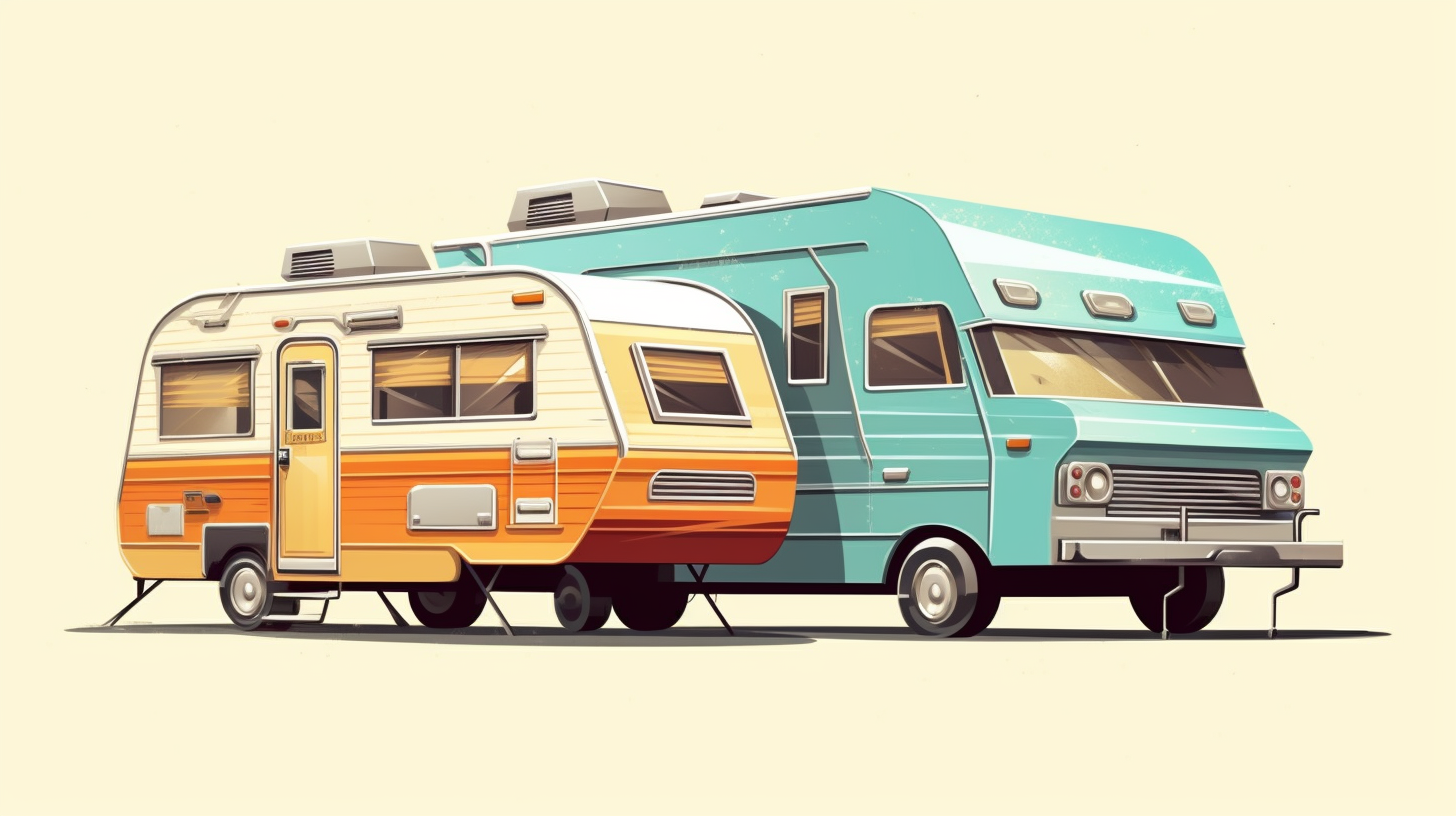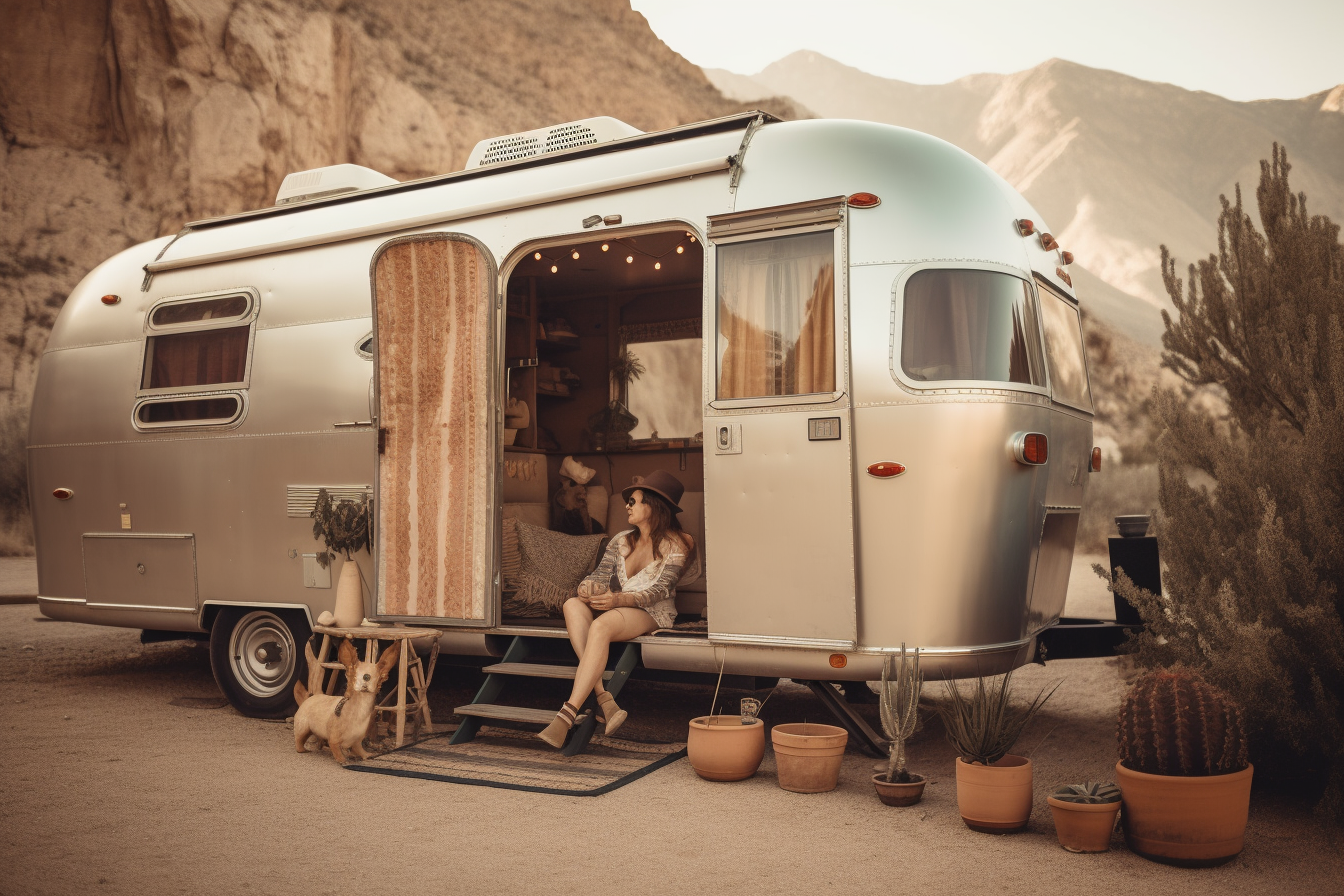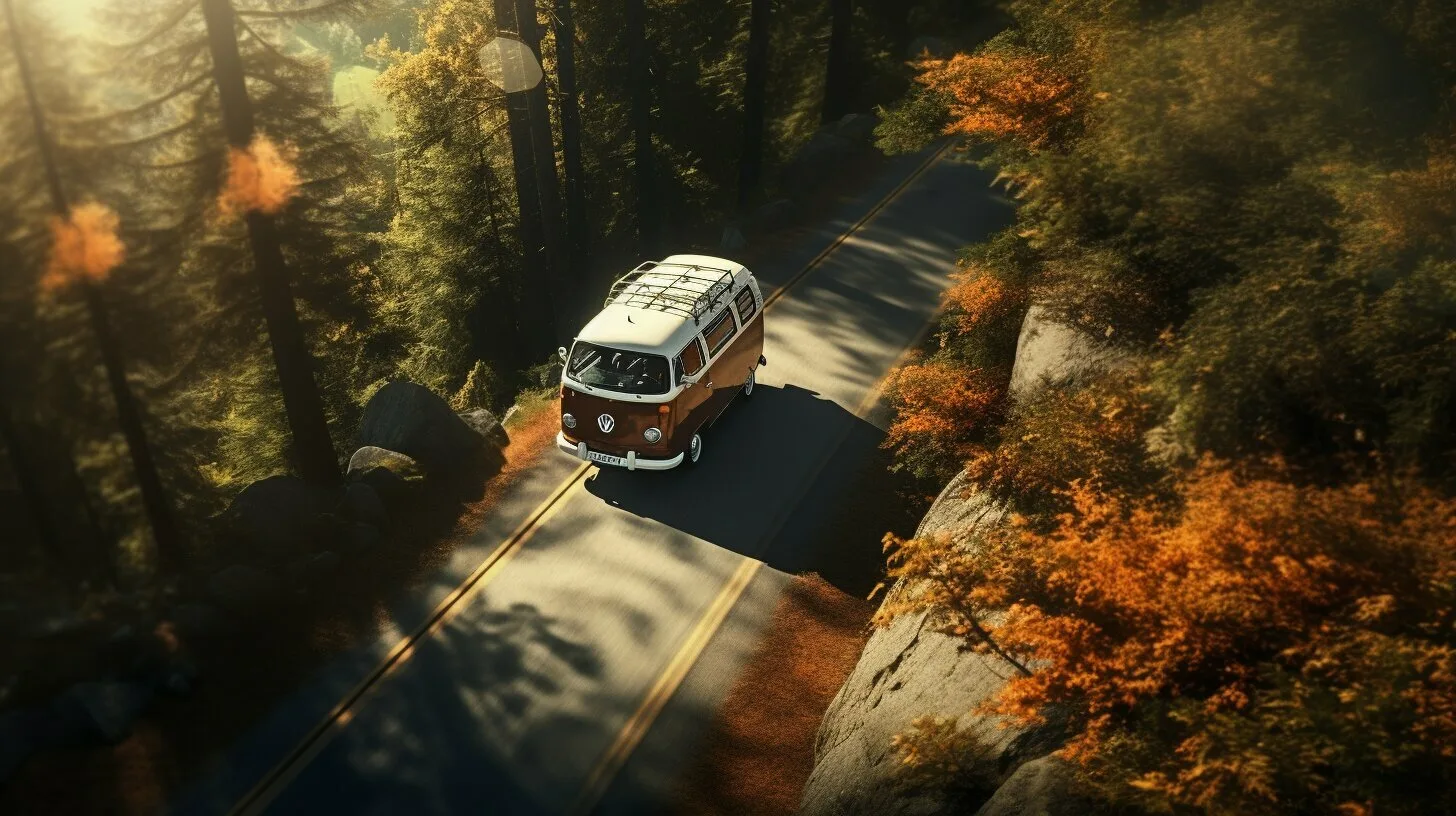You’re a free spirit, always seeking adventure and new experiences. You crave the open road and the great outdoors, and you’re ready to hit the road in search of your next adventure. But before you start packing your bags and filling up your gas tank, there’s one important question you need to answer: what is the difference between a camper vs. RV?
Think of it like this: if camping were a game of football, campers would be the quarterbacks – nimble, agile, and able to move quickly from one play to the next. RVs, on the other hand, are more like linebackers – big, powerful, and designed for long-term plays on the field.
Understanding these differences is crucial if you want to choose the right vehicle for your camping or traveling needs. In this article, we’ll explore everything you need to know about campers and RVs – from their definitions to their various types and costs – so that you can make an informed decision about which vehicle is best for your lifestyle.
So buckle up (or strap in), because we’re about to embark on a journey that will take us through some of the most beautiful landscapes in America!
Table of Contents
Camper vs. RV – Definitions
RVs and campers are often used interchangeably, but “camper” refers to anything used for camping, including motorhomes and pull-type RVs such as travel trailers and fifth wheels. An RV is a vehicle that has its own engine and can be driven independently.
Definition of Different Types
When you’re deciding what type of vehicle to take on your next camping adventure, it’s important to understand the distinctions between various options like pop-up trailers, Class A motorhomes, and fifth-wheel campers.
Pop-up trailers are small and lightweight, with minimal amenities, making them a good choice for short trips or those who don’t require much space.
Travel trailers come in a wide range of sizes and styles, from small to large, with varying amenities such as kitchens and bathrooms.
Fifth-wheel campers are the largest tow-behind campers and require a specifically fitted hitch.
Class B RVs are the smallest fully-motorized RVs that resemble an oversized van while Class C RVs are larger than Class Bs and have an overhanging section that extends over the roof of the cab.
Class A motorhomes are built on commercial buses, trucks, or motor vehicle chassis and can sleep up to 10 people. They offer ample space for storage and luxurious amenities such as living rooms, full-sized kitchens, and bathrooms.
It’s essential to consider the differences between these types of RVs when choosing which one is right for you based on your budget, intended use, and comfort level in driving or towing a large rig.
Cost Considerations for Campers and RVs
If you’re looking to hit the open road and explore the great outdoors, it’s important to keep in mind that camper and RV costs can vary widely depending on style and features. The cost of a camper or RV can range from $10,000 for a basic model to over $300,000 for a luxury motorhome. When considering cost considerations for campers and RVs, it’s important to think about your budget, intended use, and desired amenities.
To help you get an idea of the different types of vehicles available and their associated costs, here is a table outlining some popular options:
| Type of Vehicle | Average Cost |
|---|---|
| Pop-up Camper | $10,000 – $20,000 |
| Travel Trailer | $15,000 – $50,000 |
| Fifth Wheel Trailer | $30,000 – $150,000 |
| Class B Motorhome | $60,000 – $130,000 |
| Class C Motorhome | $70,000 – $200,000 |
| Class A Motorhome | $1000,00+ |
Keep in mind that these are just average costs and prices can vary depending on factors such as manufacturer reputation and extra features. It’s important to do your research before making a purchase to ensure you find the right camper or RV for your needs at a price point that works for you.
Class A Motorhomes
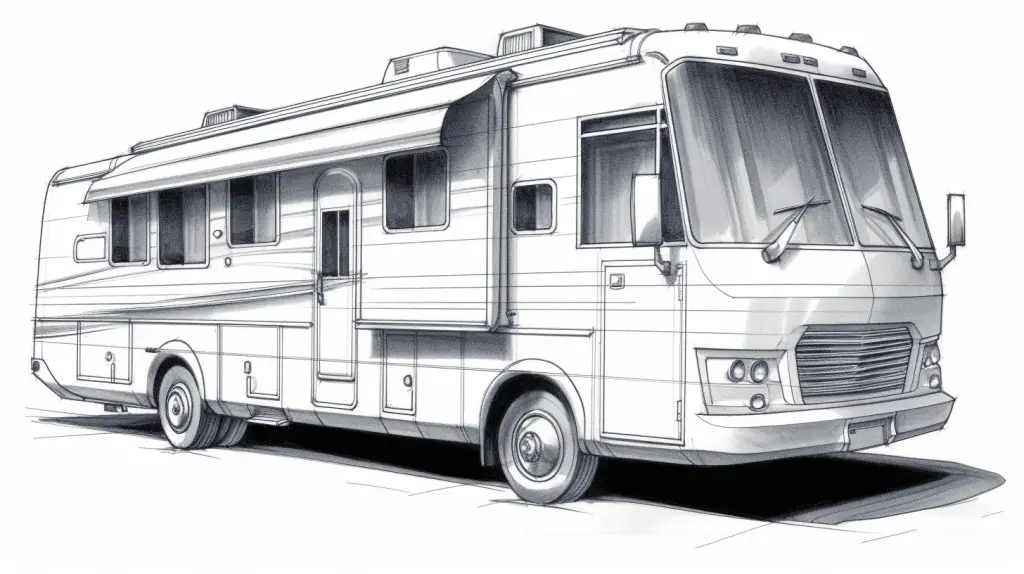
Class A motorhomes are the behemoths of the RV world, offering unparalleled luxury and space for those who want to travel in style. These types of motorhomes can be built on commercial buses, trucks, or motor vehicle chassis with a large diesel engine in the rear for a quiet and smooth ride.
They also provide residential-style appliances, multiple slideouts, plenty of storage compartments, and sleeping quarters that can accommodate up to 10 people. If you’re looking for something larger than a camper or standard RV, a Class A motorhome may be just what you need.
With their spacious interiors and luxurious amenities, Class A motorhomes provide all the comforts of home while still allowing you to explore the great outdoors. Whether you’re planning a family vacation or embarking on a solo adventure, there’s a Class A motorhome out there that will suit your needs perfectly.
So why wait? Start exploring your options today and find the perfect RV for your next road trip!
Class B Motorhomes
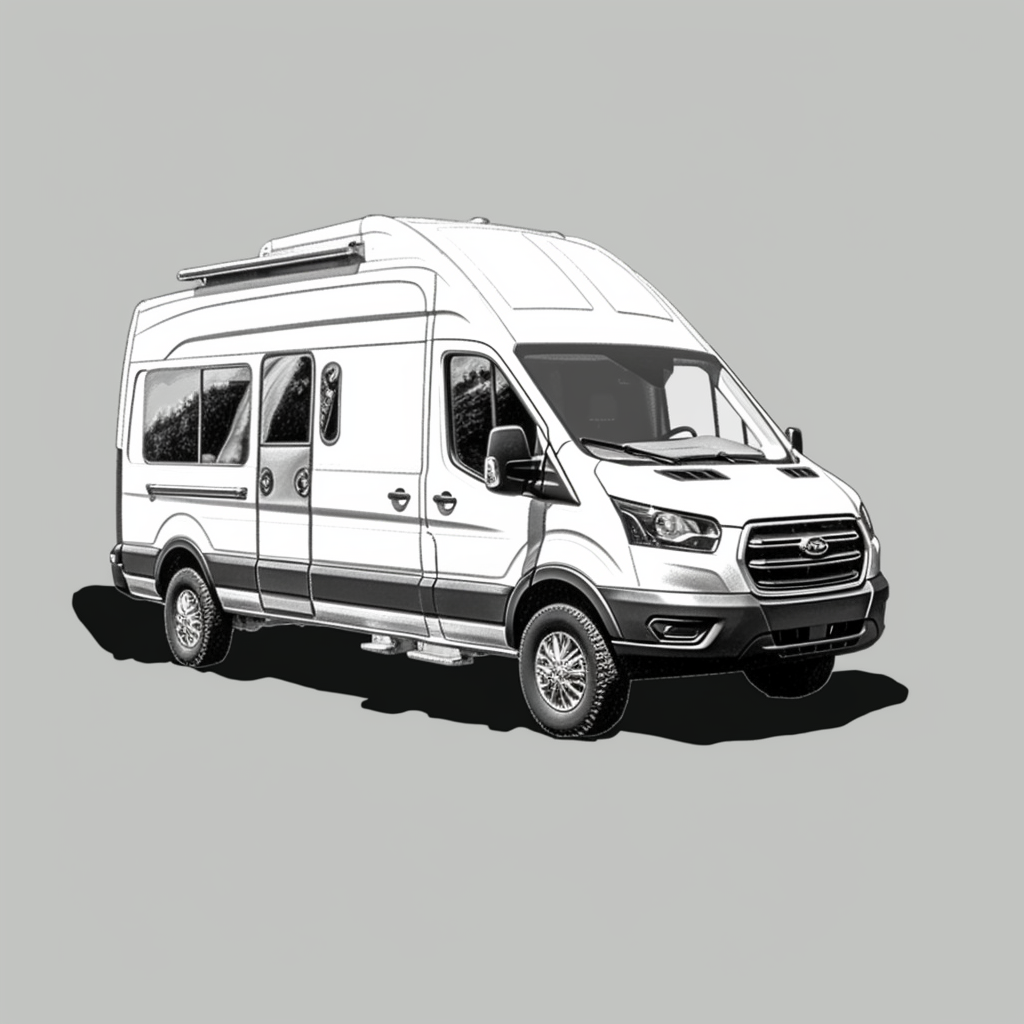
You’ll love the nimble and easy-to-drive Class B motorhomes, perfect for solo travelers or couples looking to hit the road. These RVs are built on van chassis, making them drive like a standard automobile. They’re also known as camper vans and offer all the amenities of a larger RV in a compact size.
Class B motorhomes are ideal for those who want to travel light but still have all the comforts of home. They come equipped with a kitchenette, bathroom, sleeping area, and storage space. Unlike other types of RVs, Class Bs can be parked almost anywhere and don’t require special hookups or towing equipment.
If you’re looking for an affordable and convenient way to explore the country, consider renting or buying a Class B motorhome or trailer today!
Class C Motorhomes
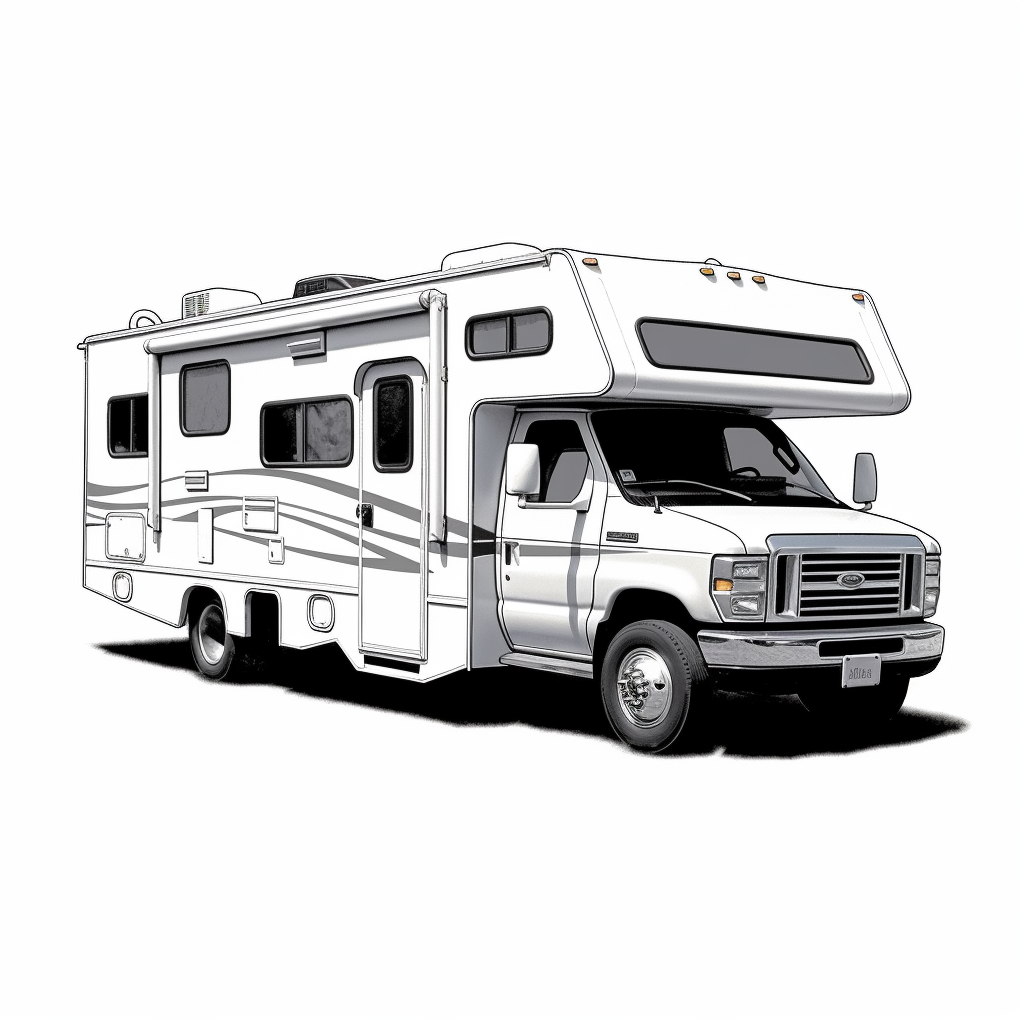
Get ready to hit the road in style with a Class C motorhome, the perfect choice for families and couples who want to explore remote areas and enjoy all the amenities of a larger RV.
These motorhomes are built on a truck chassis, with a distinctive ‘cab-over’ profile that provides extra sleeping space or storage. They offer similar amenities to Class A motorhomes but on a smaller scale.
With their shorter chassis, they can travel to places larger RVs can’t fit, making them perfect for remote exploring and camping. Class C motorhomes are ideal for those who love the outdoors but still want the comforts of home.
They come equipped with kitchens, bathrooms, and living areas that provide ample space for relaxation and entertainment. Unlike trailers or campers that require towing by another vehicle, Class C motorhomes are self-contained units that allow you to drive comfortably from one location to another without having to worry about hitching or unhitching.
So if you’re looking for an RV that is easy to maneuver yet offers plenty of living space and amenities, consider a Class C motorhome as your next adventure mobile!
Super C Motorhomes
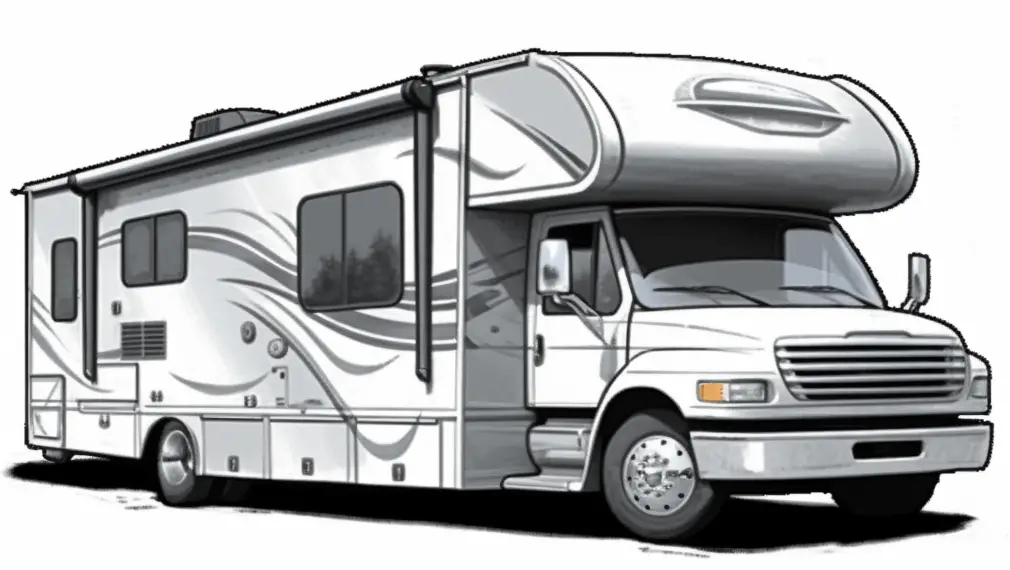
If you’re seeking a luxurious and easy-to-drive RV, consider opting for a Super C motorhome built on a larger truck chassis than the typical Class C. These hybrid RVs are similar in build to Class C motorhomes but have more powerful diesel engines and can tow up to 25,000 pounds or more. With their larger wheelbase, Super Cs provide sturdier handling on the road than other types of campers and RVs.
To help you decide which type of RV is best for your needs, here’s a comparison table of different types of campers and RVs:
| Type | Size | Cost | Amenities |
|---|---|---|---|
| Pop-up camper | Small to medium-sized trailer that collapses down for easy towing and storage. | Affordable. | Limited amenities such as minimal sleeping space and no bathroom or kitchen facilities. |
| Travel trailer | Non-motorized trailers pulled by an SUV or pickup truck. Can range from small to large with varying amenities. Generally mid-range in cost. | Mid-range cost with varying options available based on size and amenities desired. Can include full kitchens and bathrooms with enough sleeping space for up to eight people depending on size. | |
| Fifth wheel camper | Largest tow-behind trailers that require a specifically fitted hitch; can only be towed by certain pickups or full-size trucks due to their weight capacity requirements. Most expensive among all types of campers due to their size, amenities provided, luxury features included such as home theater systems, fireplaces etc. | Expensive compared to other travel trailers; however it provides deluxe amenities like multiple slide-outs allowing extra living space along with residential-style appliances in some cases. | Offers great amount of storage. They attach to the U-shaped coupling mounted on the cargo bed of the truck. |
| The table above outlines some key differences between these three popular types of campers/RVs: pop-up campers, travel trailers, and fifth-wheel campers. As you can see, each type has its own unique features and benefits depending on what the camper is looking for in terms of amenities, size, cost, and towing requirements. When choosing an RV or camper, it’s important to consider factors such as budget, intended use, comfort level in driving or towing a large rig, and whether or not your ideal destination has length limits for RVs. |
Truck Campers
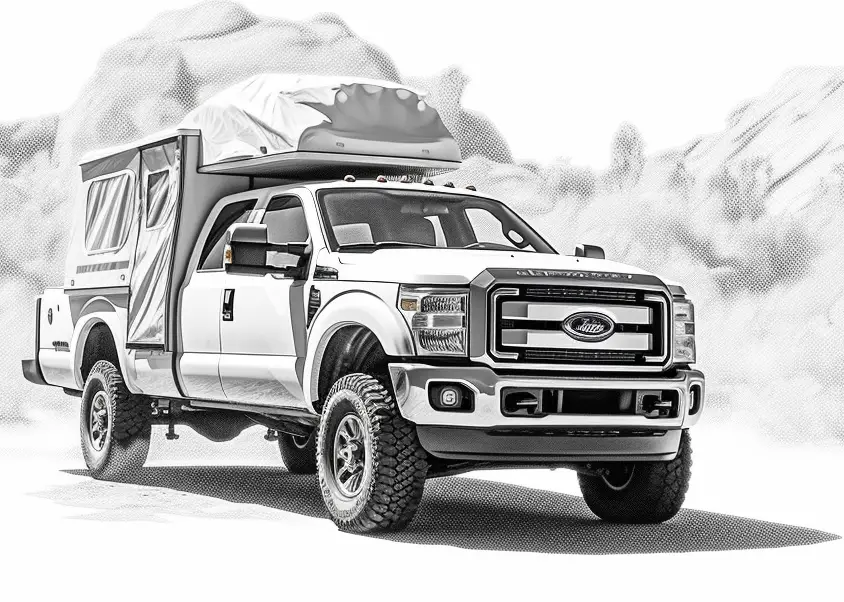
Mountable on the bed of a pickup truck, truck campers are a great option for those looking for an RV that can go anywhere the truck can go and are as easy as pie to load and unload.
Unlike other types of RVs, truck campers don’t require a separate vehicle to tow them. They’re designed to be mounted on the back of a pickup truck, making them extremely maneuverable and able to fit into tight spaces that larger motorhomes cannot.
Truck campers come in various sizes and styles, ranging from hard-sided models with all the amenities of home to pop-up versions that collapse down for easy towing and storage. They’re considered one of the smallest RV classes with most states not even counting them as recreational vehicles but rather cargo instead.
Despite their small size, they offer many features commonly found in larger RVs such as bathrooms, kitchens, sleeping areas, and entertainment systems.
If you’re looking for an affordable and versatile way to travel while enjoying all the comforts of home, a truck camper might be just what you need.
Popup Campers
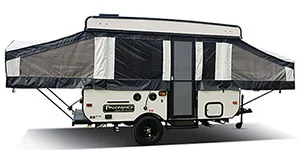
Now that you know about truck campers, let’s talk about another type of RV – popup campers. These affordable and lightweight recreational vehicles are perfect for those who want to experience camping without sleeping on the ground in a tent.
Also known as camper trailers, popup campers are non-motorized and collapsible, making them easy to store and tow with a variety of vehicles. They typically have canvas walls that pop up into living space when parked, providing more comfort than a traditional tent while still allowing you to enjoy the great outdoors.
While they may not have all the amenities of larger RVs, they offer a cozy and budget-friendly option for those looking to hit the road and explore nature.
Travel Trailers
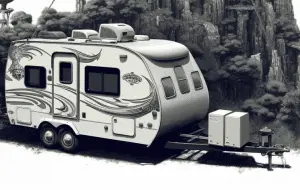
You’ll love travel trailers because they offer the perfect combination of mobility and comfort for your next adventure. Here are some things to consider when looking at different types of travel trailers:
- Types: There are many types of travel trailers, ranging from small teardrop models that can be towed by almost any vehicle to larger models with multiple slide-outs that offer plenty of living space.
- Cost comparison: Travel trailers tend to be less expensive than motorhomes, making them a great option for those on a budget. They also offer more flexibility in terms of being able to detach the trailer from the towing vehicle and use it as a standalone unit.
- Features: Many travel trailers come equipped with amenities such as kitchens, bathrooms, and sleeping areas. Some even have outdoor kitchens or entertainment systems. Consider what features are important to you when choosing a travel trailer.
Overall, travel trailers are an excellent option for those looking for a comfortable and mobile camping experience without breaking the bank. With so many different types available, there’s sure to be one that fits your needs and budget.
Fifth Wheel Trailers

If you’re looking for a spacious and luxurious RV option, fifth-wheel trailers might be the perfect fit for your next adventure. These larger trailers are designed to be towed by pickup trucks that have a special U-shaped coupling mounted on the cargo bed. Fifth wheel trailers are known for their ample storage space, multiple slideouts, and residential-style features.
In comparison to other types of RVs such as camper vans or smaller travel trailers, fifth-wheel trailers offer more living space and comfort. They are a popular choice for families or groups who enjoy extended stays at campgrounds or RV parks. To give you an idea of what to expect with this type of trailer, here is a quick table comparing fifth-wheel trailers to other distinct types of RVs:
| Type of Trailer | Size | Amenities | Towing Requirements | Best For |
|---|---|---|---|---|
| Fifth Wheel Trailer | Larger | Multiple Slideouts, Residential-Style Features | Pickup Truck with U-Shaped Coupling Mounted on Cargo Bed | Families/Groups Who Enjoy Extended Stays |
| Camper Van | Smaller | Basic Amenities, Easy Maneuverability | Self-Contained Motor Vehicle | Couples/Solo Travelers Who Want Freedom And Mobility |
| Travel Trailer | Medium-Large | Varying Amenities Depending on Size/Model | SUV/Pickup Truck with Hitch | Couples/Families Who Want A Versatile Option |
As you can see from the table above, fifth-wheel trailers offer unique advantages over other types of RVs when it comes to space and amenities. However, they do require specific towing equipment and may not be the best fit for solo travelers or couples who prioritize mobility over luxury. Ultimately, choosing the right type of camper or RV depends on your personal preferences and intended use.
Skoolies
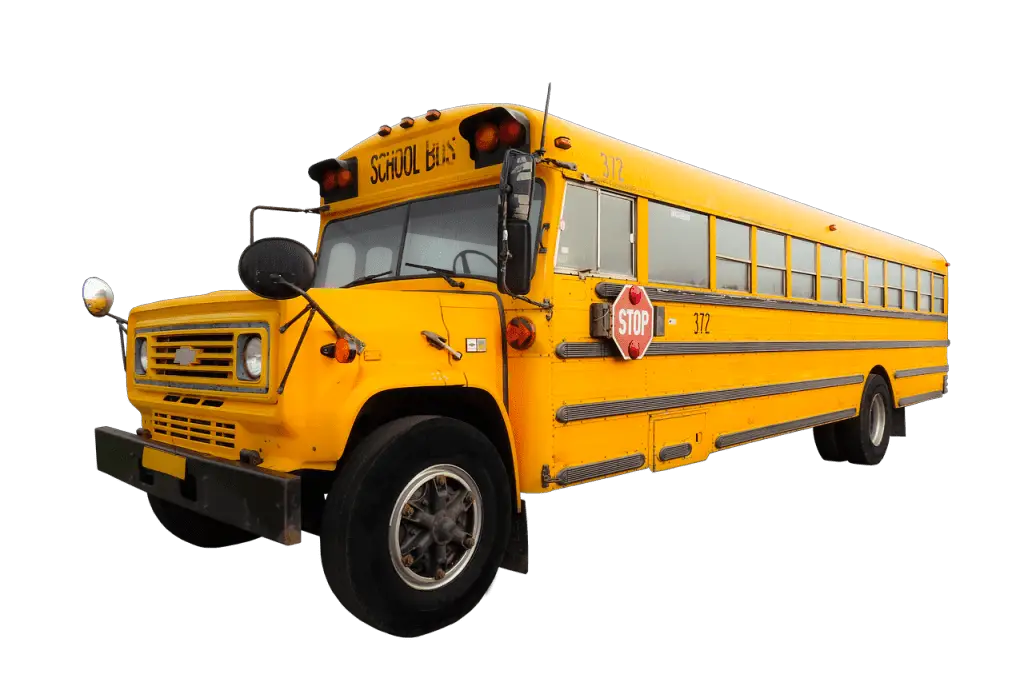
Considering the cost of traditional housing, have you ever thought about converting a school bus into your own tiny home on wheels? Skoolies are a popular trend among those seeking a more nomadic lifestyle or a more affordable permanent residence.
By repurposing an old motor vehicle, skoolie conversions offer customizable living spaces that can fit individual needs and preferences. Here are some reasons why you should consider a skoolie conversion:
- More affordable than traditional homes
- Self-sustainability through solar power enables off-grid living
- Opportunity to travel and explore new places while still having a home on wheels
- Converting a school bus reduces waste and is environmentally friendly.
With some creativity and problem-solving skills, converting a school bus into your own tiny home on wheels allows for freedom and flexibility in where you live and how you travel.
Consider joining the growing community of skoolie enthusiasts who have created their own unique spaces on the road.
Campulances (Ambulance Conversions)
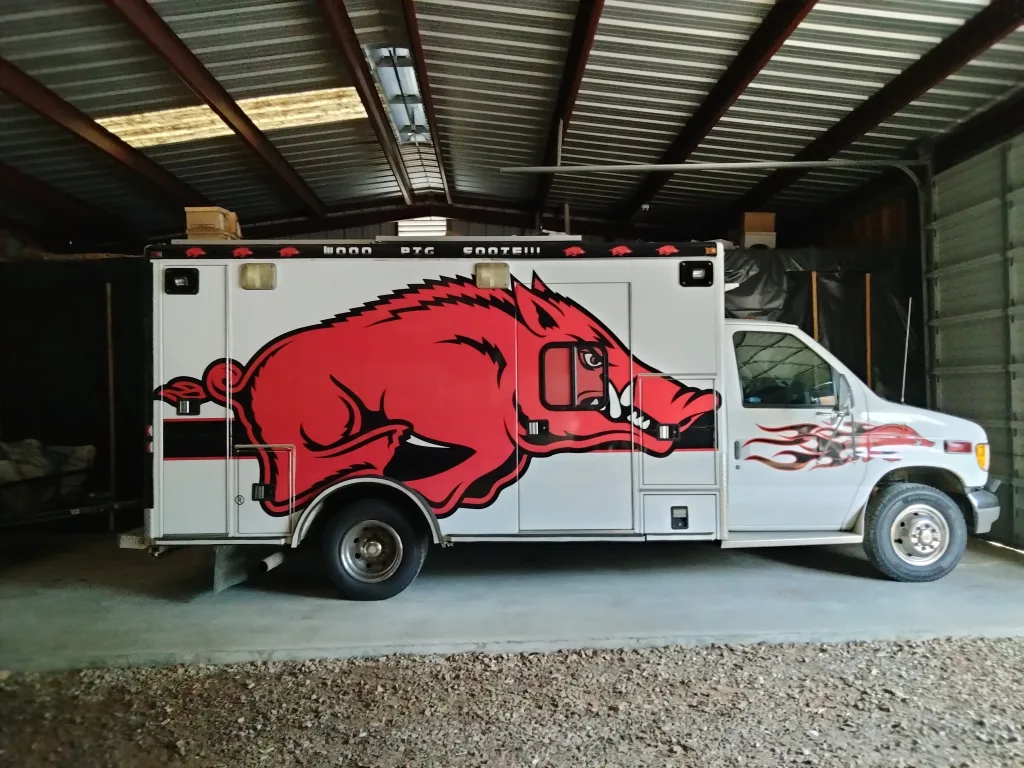
Now that you know about skoolies, let’s take a look at another unique type of camper: campulances.
These are retired ambulances that have been converted into RVs, offering a stylish and comfortable way to travel the country.
Campulances combine the best of both worlds: the convenience and maneuverability of a camper van with the spaciousness and amenities of motorhomes.
They offer plenty of room for sleeping, cooking, and relaxing while on the road. And since they were originally built for emergency medical services, they often come equipped with durable materials and high-tech features.
If you’re looking for a one-of-a-kind RV experience, consider a campulance conversion as your next adventure vehicle.
Which Type Vehicle Is Right for Me?
Determining the ideal vehicle for your travel needs requires careful consideration of factors such as budget, intended use, and comfort level in driving or towing a large rig. Here are four key considerations to help you decide which type of camper or RV is right for you:
- Vehicle Types: Camper trailers, pop-up campers, and motorhomes are all types of RVs. Consider the pros and cons of each option based on your budget and intended use.
- Classes of Campers: RVs can be categorized into classes based on size, amenities, and cost. Class B RVs are the most affordable while Class As are the most luxurious.
- Towing Requirements: Pop-ups and travel trailers are tow-behind campers while fifth wheels require a specifically fitted hitch and can only be towed by certain pickups or full-size trucks.
- Features and Amenities: Compare different types of campers based on their amenities, comfort levels, sleeping options, size, weight, and storage capacity, among others.
With these factors in mind, you can make an informed decision about which vehicle is right for your lifestyle. Whether it’s a small camper trailer or a luxury motorhome with all the bells and whistles, there’s an RV out there that will fit your needs perfectly!
Additional Resources on RVs & Campers
For those looking to learn more about RVs and campers, there are a variety of online resources available.
Camper Report offers detailed information on different types of RVs, including motorhomes and travel trailers. Curbed provides insights into pop-up campers, while AutoTrader focuses on Class C RVs. TripSavvy is another great resource for learning about Class B RVs.
Whether you’re in the market for a motorhome or a trailer, these resources can help you make an informed decision. They offer information on various features such as size, weight, towing requirements and amenities.
With their guidance, you’ll be able to choose the perfect RV or camper for your next adventure!
Conclusion
Congratulations! You’ve made it to the end of our comprehensive guide on campers and RVs.
Now that you have a better understanding of the differences between these two types of vehicles, as well as their various features and costs, you’re ready to make an informed decision about which one is right for your next adventure.
But remember, choosing a camper or RV isn’t just about the vehicle itself – it’s also about the experiences and memories you’ll create while traveling in it. So whether you opt for a luxurious Class A motorhome or a humble pop-up camper, embrace the journey and enjoy all that nature has to offer.
In conclusion, we hope this article has provided valuable insights and tips for your camping and traveling needs. Happy trails!

